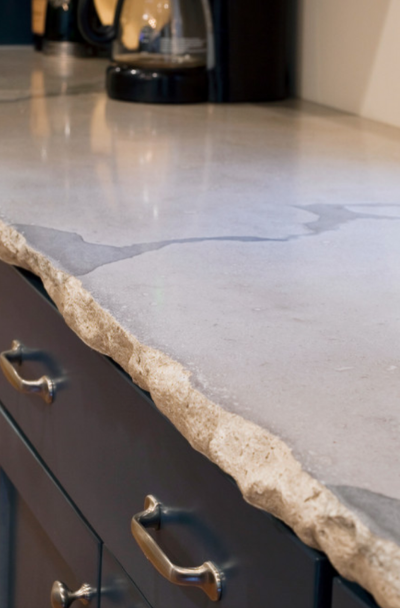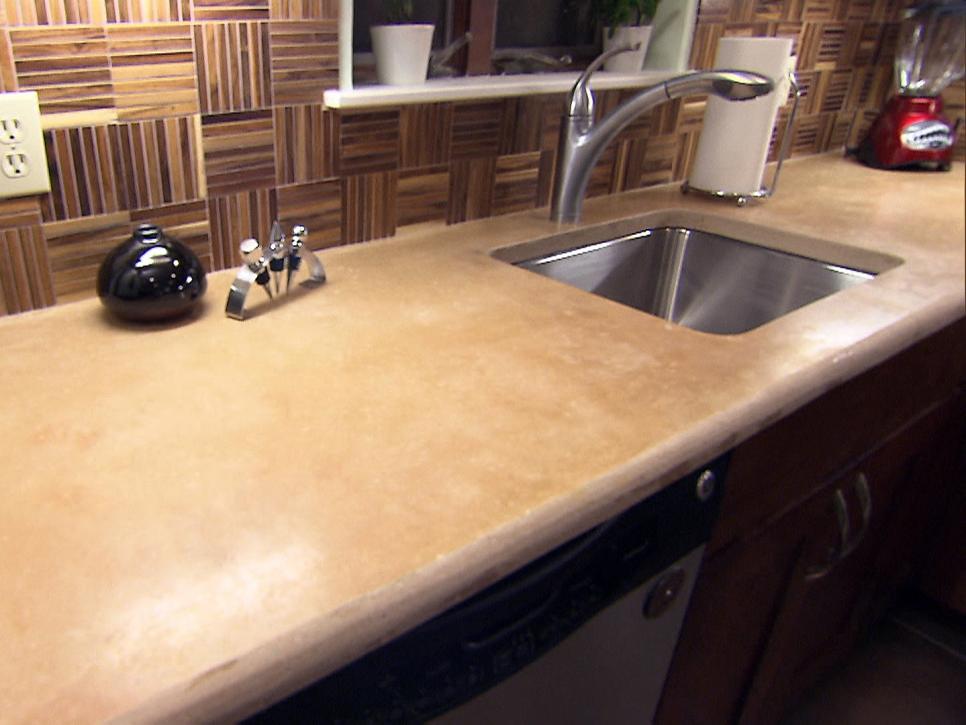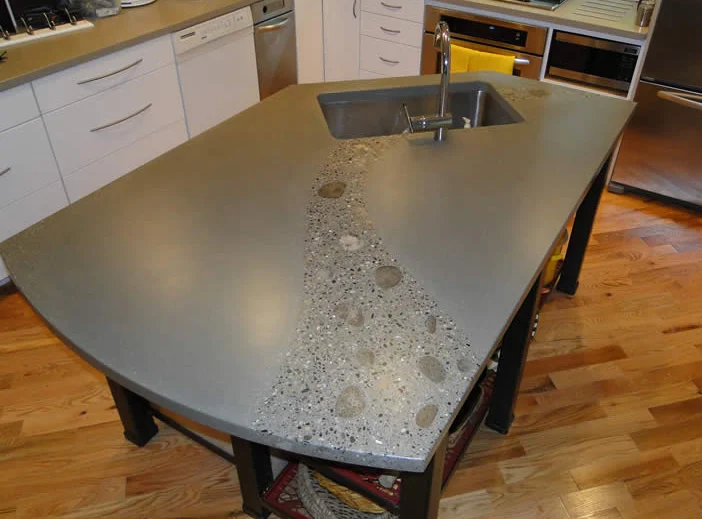Concrete countertops have become a stylish and versatile choice in modern kitchen and bathroom design. Known for their durability, customizability, and contemporary appeal, concrete countertops offer a wide range of design possibilities. Unlike traditional materials such as granite or quartz, concrete allows for a high level of creativity, enabling homeowners and designers to create unique and personalized surfaces that reflect individual tastes and the character of the space.
One of the primary appeals of concrete countertops is their ability to be completely customized. The design process starts with choosing the shape and size of the countertop, which can be tailored to fit any kitchen or bathroom layout. Unlike natural stone or prefabricated options, concrete can be molded to any configuration, including unusual angles, curves, and integrated sinks. This flexibility allows for seamless designs that integrate perfectly with the overall aesthetics of the room.
The color of concrete countertops is another area where customization thrives. Concrete can be tinted with pigments to achieve virtually any color imaginable, from subtle earth tones to bold, vibrant hues. This capability allows homeowners to match the countertop to existing color schemes or create a standout feature that contrasts with the cabinetry and flooring. The color can be mixed throughout the concrete for a consistent look or applied to the surface for a varied appearance.
In addition to color, concrete countertops offer a variety of finishes that can enhance their visual appeal. Polished concrete provides a sleek, glossy finish that can reflect light and make the space feel larger. Matte finishes offer a more understated look that can complement a rustic or industrial design. For a unique texture, homeowners can opt for exposed aggregate, where the surface is lightly sanded to reveal the natural stones within the concrete, creating a speckled, decorative effect.

Another design option for concrete countertops is the incorporation of decorative elements. Items such as glass, stones, or metal can be embedded into the surface to create intricate patterns or accents. This technique allows for the creation of one-of-a-kind designs that can include personalized touches like family heirlooms or thematic elements that reflect the homeowner’s interests or hobbies. These embedded elements add depth and interest to the countertop, making it a conversation piece.
Integral features can also be added to concrete countertops to enhance functionality and aesthetics. Integrated sinks and drainboards can be molded directly into the countertop, creating a seamless, cohesive look. These features not only add to the visual appeal but also improve practicality by eliminating seams and joints where dirt and water can accumulate. This integration results in a cleaner, more streamlined appearance and easier maintenance.
For those seeking a more natural look, concrete countertops can mimic the appearance of other materials. Techniques such as stamping and staining can create surfaces that resemble stone, wood, or even leather. These methods involve pressing patterns into the wet concrete or applying stains to achieve the desired effect. The result is a countertop that combines the durability of concrete with the aesthetic appeal of other natural materials, offering the best of both worlds.

The versatility of concrete extends to the edge profiles as well. Homeowners can choose from a range of edge treatments, from simple, straight edges to more elaborate designs like bullnose or ogee. These options allow for further customization to match the design style of the room. The ability to create different edge profiles can also enhance the durability and functionality of the countertop, preventing chipping and providing a more finished look.
Concrete countertops can also be enhanced with various types of sealers. Sealers protect the surface from stains and moisture, making the countertop more durable and easier to clean. Options include penetrating sealers that soak into the concrete for long-lasting protection and topical sealers that provide a glossy finish and added resistance to spills. Choosing the right sealer is essential for maintaining the appearance and functionality of the countertop over time.
In terms of environmental impact, concrete countertops offer several advantages. Concrete is composed of natural materials such as sand, gravel, and cement, making it a more sustainable option compared to some synthetic materials. Additionally, recycled materials can be incorporated into the concrete mix, reducing waste and further enhancing the eco-friendliness of the countertop. This makes concrete an attractive choice for homeowners looking to reduce their environmental footprint.
Concrete countertops also offer excellent heat resistance, making them ideal for kitchen use. Unlike some materials that can be damaged by hot pots and pans, concrete can withstand high temperatures without cracking or discoloration. This heat resistance adds to the practicality of concrete countertops, allowing homeowners to use the surface for cooking and food preparation without worrying about heat damage.

The ability to create large, seamless surfaces is another benefit of concrete countertops. Because concrete can be poured in place, it is possible to create expansive countertops without seams or joints. This seamless quality enhances the aesthetic appeal and makes the countertop easier to clean and maintain. Seamless designs also contribute to a more modern and streamlined appearance, which is popular in contemporary kitchen and bathroom designs.
Concrete countertops can be designed to fit various budget ranges. While custom concrete countertops can be more expensive than standard materials due to the labor-intensive process, there are options to control costs. Pre-cast concrete countertops, which are made off-site and then installed, can offer a more affordable alternative while still providing the benefits of concrete. Additionally, using less expensive pigments and finishes can help manage costs without sacrificing quality.
Maintenance of concrete countertops is straightforward but requires attention to detail to keep them looking their best. Regular cleaning with mild soap and water is usually sufficient. It’s important to avoid abrasive cleaners and harsh chemicals that can damage the sealer. Periodic re-sealing is also necessary to maintain the surface’s protective layer and prevent staining. Proper maintenance ensures the longevity and appearance of concrete countertops, making them a durable and attractive option.
Concrete countertops offer a wealth of design possibilities that make them a unique and versatile choice for modern homes. Their ability to be customized in terms of shape, color, finish, and decorative elements allows for a high degree of personalization. Whether seeking a sleek, modern look or a rustic, natural appearance, concrete can be tailored to fit a variety of design styles. The durability, heat resistance, and eco-friendly aspects of concrete further enhance its appeal, making it a practical and stylish choice for kitchen and bathroom countertops.

Common Mistakes to Avoid
When designing and installing concrete countertops, several common mistakes can affect the outcome and durability of the surface. One frequent error is neglecting to properly seal the concrete. Concrete is naturally porous, and without adequate sealing, it can absorb liquids and stains, leading to discoloration and damage. Applying a high-quality sealer that is appropriate for the type of use the countertop will endure is crucial for maintaining its appearance and functionality.
Another mistake is improper mixing of the concrete. The consistency of the concrete mix is essential for achieving a smooth, durable surface. Too much water can weaken the concrete, leading to cracks and structural issues, while too little water can result in a brittle and uneven surface. Following the manufacturer’s guidelines for mixing and using the correct proportions of water and other ingredients ensures a strong and stable countertop.
Failing to adequately reinforce the concrete is also a common issue. Reinforcement, such as steel rebar or wire mesh, is necessary to provide additional strength and prevent cracking. Without proper reinforcement, the countertop may be more susceptible to damage from everyday use. Ensuring that the reinforcement is correctly placed and embedded in the concrete mix helps maintain the integrity of the countertop.

Inadequate curing time is another mistake that can affect the quality of concrete countertops. Concrete needs sufficient time to cure and reach its full strength. Rushing the curing process or exposing the countertop to stress before it is fully cured can lead to cracks and other issues. Allowing the concrete to cure for the recommended period and protecting it from excessive heat or moisture during this time is essential for a durable finish.
Another common error is not considering the weight of concrete countertops. Concrete is a heavy material, and proper support is necessary to prevent structural issues with the cabinetry or the countertop itself. Ensuring that the cabinets and supports are capable of handling the weight of the concrete is crucial for a successful installation. Failing to account for the weight can result in sagging or even structural damage to the cabinets.
Ignoring the need for periodic maintenance can also lead to problems. While concrete countertops are durable, they do require regular cleaning and re-sealing to maintain their appearance and functionality. Neglecting these maintenance tasks can result in staining, discoloration, and degradation of the surface. Establishing a routine for cleaning and re-sealing helps keep the countertops in good condition and extends their lifespan.

What are the benefits of concrete countertops compared to other materials?
Concrete countertops offer several benefits, including a high level of customizability, durability, and a contemporary aesthetic. Unlike natural stone or prefabricated materials, concrete can be molded to fit any shape and size, allowing for unique and personalized designs. The ability to incorporate various colors, finishes, and decorative elements makes concrete a versatile choice. Additionally, concrete is heat-resistant, eco-friendly, and can be designed to fit various budget ranges, making it a practical and stylish option for modern kitchens and bathrooms.
How do I maintain concrete countertops?
Maintaining concrete countertops involves regular cleaning with mild soap and water. Avoid using abrasive cleaners or harsh chemicals, as these can damage the sealer and the concrete surface. It is also important to periodically re-seal the countertops to protect them from stains and moisture. The frequency of re-sealing depends on the type of sealer used and the level of use the countertop receives. Proper maintenance helps preserve the appearance and durability of concrete countertops over time.
Can concrete countertops be customized?
Yes, concrete countertops offer a high degree of customization. Homeowners can choose the shape, size, and color of the countertops to fit their specific needs and design preferences. Various finishes, such as polished or matte, can be applied to achieve different looks. Decorative elements like embedded glass, stones, or metal can also be added to create unique patterns or accents. The ability to integrate features such as sinks and drainboards further enhances the customization options available with concrete countertops.
Are concrete countertops durable?
Concrete countertops are highly durable and can withstand the rigors of daily use. They are resistant to heat, making them suitable for kitchen applications. Properly sealed concrete countertops are also resistant to stains and moisture. However, they can be susceptible to cracking if not adequately reinforced or if exposed to significant stress before fully curing. Regular maintenance, including re-sealing, helps maintain their durability and ensures a long-lasting surface.
What should I consider when installing concrete countertops?
When installing concrete countertops, consider factors such as the weight of the concrete, proper support, and the need for adequate curing time. Concrete is heavy, so the cabinetry and supports must be capable of handling the weight. Reinforcement is necessary to prevent cracking and ensure structural stability. Adequate curing time is essential for the concrete to reach its full strength. It is also important to choose the right type of sealer based on the intended use of the countertop and to plan for regular maintenance to keep the surface in good condition.

Creative Concrete Countertop Designs

Custom Iron, Concrete CounterTops
Amazing and stylish kitchens with concrete countertops

epoxy/stained concrete countertops

Related articles:
- Concrete Countertops Designs
- Concrete Countertops That Look Like Wood
- White Concrete Countertops
- Concrete Countertop Drainboard
- White Painted Concrete Countertops
- Concrete Countertops Acid Stain
- Unique Concrete Countertops
- Concrete Countertops Refinishing
- Decorative Concrete Countertops
- Overlay Concrete Countertops
